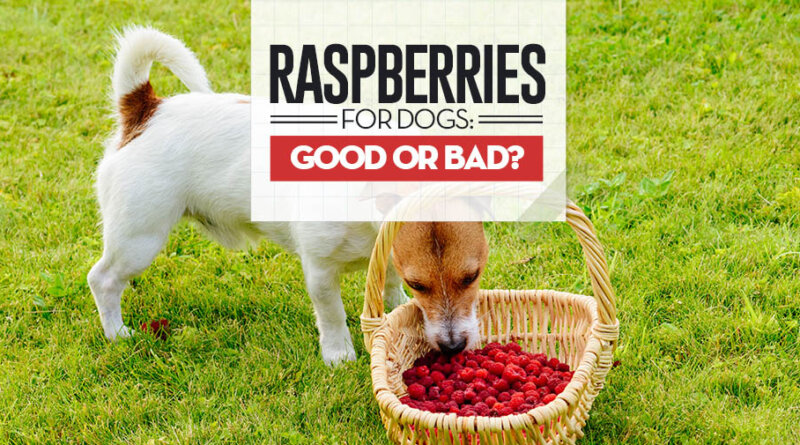Raspberries for Dogs 101: Can Dogs Eat Raspberries?
[ad_1]
The summertime superfruit and raspberries offer plenty of nutrition and benefits to humans.
But can dogs eat raspberries too, and are raspberries for dogs safe to consume?
What are the health benefits of giving raspberries to a dog, and are there any side effects?
Let’s take a closer look.
If you’ve been wondering, “can I give my dog raspberries,” the answer is YES.
Dogs can eat raspberries without problems, and raspberries are not toxic to dogs.
However, as with most new food items, it’s essential to introduce them slowly and feed them just a little.
Most berries, including raspberries, are nutritious for people and provide multiple health benefits.
Almost the same can be said about feeding berries to dogs, and raspberries for dogs are one of the best.
But there are a few things you must know first.
ALSO READ: Can Dogs Eat Cherries?
What are raspberries?
Raspberry is a rich, red, and sweet edible fruit.
The four most common raspberry species belong to the rose family: Boulder raspberry, Australian native raspberry, Mauritius raspberry, and Korean raspberry.
The most popular are hybrids.
Raspberries are incredibly healthy and nutritious.
They are very rich in antioxidants. In fact, one study showed that raspberries (alongside blackberries and blueberries) have one of the highest levels of antioxidants of all commonly consumed fruits (1).
This is what raw raspberries look like:

Research shows that consuming raspberries can provide tons of health benefits.
They are also very sweet, tasty, and low in calories, which makes raspberries a perfect healthy treat.
But can dogs eat raspberries and reap the same benefits as humans do?
There needs to be more research on the effects of raspberries on dogs.
However, drawing from other research on how food affects dogs similarly to humans, there’s a good chance there’s some overlap.
Let’s break down all the health benefits, and nutrition raspberries for dogs may provide.
Can Dogs Eat Raspberries? Raspberries for Dogs 101
So can dogs eat raspberries just as people can? Yes, absolutely – raspberries for dogs are safe to consume and are non-toxic.
Just keep in mind that when you start feeding raspberries to your dog, begin slowly with very small amounts and as an occasional treat.
Raspberries are chuck full of nutrition, and here are the main things:
- Vitamin B6
- Vitamin C
- Potassium
- Magnesium
- Iron
- Manganese
- Fiber
These minerals and vitamins are the main reason why feeding a dog raspberry may provide various health benefits.
There’s been a lot of research studying raspberries (and other berries) for their benefits, so here’s just a brief on what we know.
- Raspberries may help reduce oxidative stress (2)
- Raspberries reduce blood sugar and insulin response (3, 4, 5)
- Raspberries fight inflammation in the body (6)
- Raspberries lower cholesterol levels (7)
- Raspberries are great for the skin (8, 9, 10)
- Raspberries may protect from and fight cancer (11, 12, 13, 14, 15, 16)
- Raspberries may keep arteries healthy (17)
As you can see, there are tons of reasons to eat raspberries yourself, and probably plenty of good reasons to give raspberries to dogs.
In fact, a lot more research indicates that raspberries are one of the best superfruits people and animals can eat.
Benefits of berries for dogs
Raspberry is not the only powerful food with tons of nutrients that can improve both peoples’ and animals’ health.
Actually, berries for dogs can be a great addition to the diet, and tons of research has shown the many benefits berries have on health.
As long as these raspberries don’t become a major staple and more of a snack, they can be great for overall health.
Aside from raspberries, the other three most popular berries for dogs to feed are:
- Blueberries
- Strawberries
- Blackberries
For many reasons, all three above berries are valuable and healthy for dogs.
Now let’s look at how giving raspberries to dogs may also benefit them when looking at each nutrient found in this superfruit called raspberry.
RELATED: Can Dogs Eat Watermelons?
10 Benefits of Raspberries for Dogs

With so much research behind raspberries and berries in general, there is a good reason why giving raspberries to dogs may be unhealthy and highly beneficial.
Just make sure to start with small amounts and monitor your pet.
In the meantime, here are the ten benefits of raspberries for dogs:
Raspberries improve digestive function and promote weight loss in dogs.
Raspberries are extremely high in dietary fiber (15 g carbs, 8 of which are fiber).
Dietary fiber makes up roughly 20% of a raspberry’s weight, boosting dogs’ gastrointestinal systems.
Fiber helps regulate bowel movements, improves digestion, and encourages weight loss in dogs because it slows the digestive process.
Raspberries can fight cancer and liver disease.
As shown in many human studies, raspberries may be one of the best foods to eat to prevent and fight canine cancer.
Raspberries are one of the richest fruits of all in terms of antioxidants.
In particular, they are known for ellagic acid, which has been shown to have anti-cancer properties (18).
Studies show that including foods with ellagic acid in them may have the ability to prevent the spread of cancer cells and tumor growths all across the body.
Additionally, ellagic acid can help protect the liver and promote healthy liver function.
Anthocyanins in raspberries may help prevent infections in dogs.
Raspberries for dogs have a mighty anti-inflammatory function, as shown above.
On top of that, the anthocyanins found in raspberries help to neutralize free radicals from damaging cells and may also decrease the growth rates of bacteria within the dog’s body.
This prevents many different infections in dogs (19).
Vitamin B in raspberries promotes healthy body functions.
Vitamin B is known for its many different benefits for dogs.
In particular, Vitamin B6 (Pyridoxine) produces hormones, proteins, and neurotransmitters in the canine body.
It is integral to potentially preventing anemia in dogs.
Raspberries contain Vitamin C for a more robust immune system.
Vitamin C (Ascorbic acid) is an all-known important antioxidant and nutrient.
It strengthens a dog’s immune system, combats degenerative conditions, and promotes cartilage and collagen synthesis in dogs.
Potassium in raspberries helps regulate vital body functions.
Dogs need potassium in their diet, and raspberries have a good amount of it.
Potassium strengthens muscle development in dogs, maintains healthy blood vessel functions, and replaces lost electrolytes in a canine body.
Iron in raspberries is necessary for healthy enzymes and blood functions.
A dog’s body requires certain iron levels to be maintained for the body’s enzymes to function correctly and efficiently.
Raspberries are a good source of iron.
Iron helps the body create hemoglobin, a molecule responsible for carrying oxygen to red blood cells in dogs.
The magnesium in raspberries assists with a dog’s body development.
Ensuring your dog gets enough magnesium is important for many reasons, the fact that magnesium promotes protein production and bone growth in dogs.
It also helps the canine body to better absorb vitamins and other minerals.
Manganese for stronger muscle development and weight loss.
Manganese is another mineral that is vital to a dog’s overall health.
It is essential for healthy ligament development, proper usage of carbohydrates and proteins by the dog’s body, the creation of fatty acids and energy production, and reproduction processes.
Manganese also keeps the body’s metabolic rate at a higher level, increasing fat burn.
Raspberries have anti-inflammatory properties for joint health.
As we have discussed already, one of the main benefits of consuming any and all berries is their highly potent anti-inflammatory effects which apply to dogs.
Dogs with canine arthritis or hip dysplasia may benefit a lot from added raspberries to their diet because of the anti-inflammatory antioxidants within raspberries.
These antioxidants may ease your dog’s pain and discomfort and put more pep in her step.

“So, can I give my dog raspberries?”
Yes, you can give your dog raspberries, and there are plenty of good reasons to do so.
Raspberries are very healthy for dogs and may provide tons of vital benefits.
However, always start with minimal raspberries for dogs, and monitor your pet when you give them this superfruit berry.
It’s best to feed raspberries to dogs in moderation and as an occasional treat rather than make it their regular diet.
After all, raspberries are still full of natural sugar, which dogs generally do not require in their diet.
The Bottom Line: Raspberries are a highly nutritious berry that offers a dog many potential health benefits.
The caveat is to ensure they do not become a regular food that your dog consumes A LOT OF in their diet.
More on that in a bit…
READ ALSO: Can Dogs Eat Almonds?
2 Potential Side Effects of Raspberries for Dogs

Generally, unless eaten in very large quantities, raspberries for dogs do not have any side effects on canines. They can be safely consumed in moderate amounts.
Also, always wash raspberries thoroughly to rid them of pesticides and bacteria.
Even though raspberries for dogs may be very healthy and an occasional good treat, there are two things that you need to keep in mind if you want to give raspberries to your dog.
Gastrointestinal upset.
Giving too many raspberries (sometimes even a little) may result in vomiting, constipation, or diarrhea.
This is most often seen when raspberries are fed in excess to a dog or introduced too quickly into a dog’s diet.
To avoid it, start with very small amounts and do not make it a regular treat.
Xylitol in raspberries.
What most people don’t know is that raspberries are one of the few fruits with the highest level of natural xylitol in them, according to research (20).
There are approximately 400 micrograms of xylitol per 1 gram of raspberries.
As many pet owners know by now, xylitol is toxic to dogs (21).
It can contribute to developing liver disease and hypoglycemia in dogs, which can be life-threatening to your pet if left untreated.
But is natural xylitol found in raspberries also toxic to dogs?
The answer is yes.
Natural xylitol is still toxic to dogs.
However, your dog would need to eat a lot of raspberries for xylitol to kick in, poison, and potentially kill the dog.
Let’s do the math:
1 cup of raspberries contains approximately 0.05 grams of xylitol.
For it to be fatal, a 20 lb dog must ingest about 2-4 grams of xylitol to cause low blood sugar in the canine and nearly 16 grams of xylitol.
Now, for xylitol in raspberries to cause hypoglycemia in dogs, your 20 lb canine would need to eat at least 4-6 full cups of raspberries.
And for raspberries to kill your 20 lb dog, he’d need to ingest about 30-32 cups.
The bottom line is that not even people usually consume that many raspberries.
So long as you don’t overfeed your dog on them, xylitol in raspberries will not be an issue.
Can Dogs Eat Raspberries? Summary
In conclusion, dogs can eat raspberries, which are not toxic to dogs.
In fact, raspberries can provide many health benefits to canines.
Fed as an occasional treat and in moderation, raspberries are a recommended ingredient in homemade dog food.
They are an excellent alternative to fatty, sugary, processed treats.
The beneficial qualities of raspberries can strengthen a dog’s vital body functions, improve the immune system and bolster the digestive system.
The fruit also helps fight cancers and infections, ease the pain of canine arthritis, and promote healthy weight loss.
Remember that large amounts of raspberries may upset your dog’s stomach, and extremely high quantities of raspberries may cause hypoglycemia or even be fatal.
References
READ NEXT: 11 Best Superfoods for Dogs That May Improve Their Health
Related
[ad_2]
Source link






